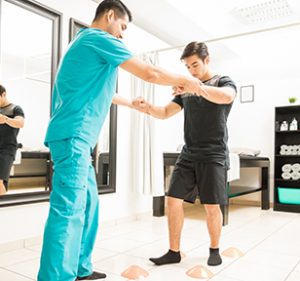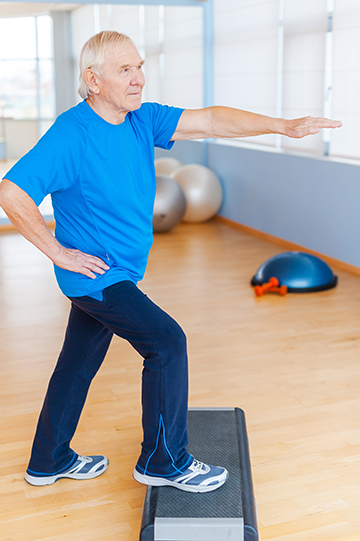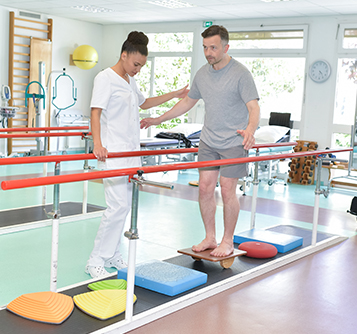Neurological Physical Therapy
 Multiple conditions and head trauma can damage the nervous system affecting movement, coordination, and balance. Just as physical therapy can help the body recover function after injury or surgery, specialized neurological physical therapy can also help the brain’s nervous system reconnect messaging to the body’s muscles to gain improved control over movement.
Multiple conditions and head trauma can damage the nervous system affecting movement, coordination, and balance. Just as physical therapy can help the body recover function after injury or surgery, specialized neurological physical therapy can also help the brain’s nervous system reconnect messaging to the body’s muscles to gain improved control over movement.
OrthoIllinois’ services can help people become active after a serious neurologic injury or disease. Our specialists in neurological physical therapy understand the specific needs of a patient with a neurological disorder.
The nervous system is complex, as it regulates and controls all of the workings of the body. When something goes wrong with a part of the nervous system, the result can be difficulty moving, speaking, swallowing, breathing, or learning. There can also be problems with memory, senses, or mood.
Physical therapy is extremely important for patients who have had or who currently have neurological diseases or injuries to improve function, mobility, safety, and independence.
Neurological physical therapy restores movement, improves quality of life, and safety.
What conditions do we treat?
- Balance challenges/fall prevention
- Dizziness, vertigo
- Head injury, traumatic brain injury
- Stroke
- Multiple Sclerosis
- Parkinson’s Disease
- Movement and coordination disorders
Our therapy goals
- Maximize independence
- Improve safety in home and community
- Improve endurance
- Improve ease and efficiency of movement
- Reduce risk of falls
- Optimize strength, flexibility, and coordination
Why Neurological Physical Therapy?
- Falls are the leading cause of fatal injury and the most common cause of nonfatal trauma-related hospital admissions among older adults.
- 1 in 4 Americans aged 65+ falls each year.
- Each year, at least 300,000 older people are hospitalized for hip fractures; more than 95% of hip fractures are caused by falling.
- 1 out of 5 falls causes a serious injury such as broken bone or head injury.
- Many people who fall, even if they are not injured, become afraid of falling. This fear may cause a person to cut down on their everyday activities. When a person is less active, they become weaker and this increases their chance of falling.
A neurologically-trained physical therapist specializes in the evaluation and treatment of individuals with movement problems related to disease or injury of the nervous system.
Therapists who specialize in neurology work with a
wide range of patients who may have any of the following conditions:
– Balance or gait disturbances, frequent falls
– Dizziness/vertigo
– Stroke
– Brain injury
– Parkinson’s disease
– Multiple sclerosis
– Movement/coordination disorders
How can Neurological Physical Therapy help?
Following diagnosis by a physician, the physical therapist will do a comprehensive evaluation of function and issues related to maintaining function and improving safety and independence. Therapists can help a patient regain lost functions, allowing a patient to improve safety and independence. Treatment can lead to a better quality of life for patients, family, and caregivers.
Our therapists have specialized training in treatment of individuals with neurological disorders and are dedicated to utilizing the most recent, evidenced-based treatments, allowing each patient to engage in meaningful and purposeful activities of daily life. Our treatment approach is individually tailored to address problems specific to each patient and his or her needs and lifestyle.
Stroke/Brain Injury:
- Regain lost function
- Relearn movement patterns and reduce compensations
- Improve gait and transfers
- Improve flexibility, reduce spasticity
- Improve endurance
- Reduce risk of falls
Parkinson’s Disease:
- Improve speed, efficiency of movements
- Reduce episodes of freezing, improve ease of movement
- Reduce spasticity/tone/tension, improve flexibility
- Improve balance and gait
- Retrain posture
- Improve reaction timing
- Reduce regression
Multiple Sclerosis:
- Improve flexibility, reduce spasticity
- Improve balance and gait
- Improve functional mobility
- Improve endurance and independence
- Reduce regression
Dizziness/Vertigo:
- Techniques for reducing dizziness
- Functional bending, lifting w/o dizziness provocation
- Gaze stabilization
- Habituation exercises


